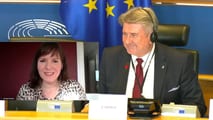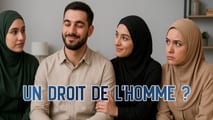The European Court of Human Rights delivered a Grand Chamber judgment on April, 8, 2021 declaring the current childhood vaccination requirement in the Czech Republic to be in compliance with the European Convention on Human Rights. The ECLJ intervened in this case. In this show, in French only, we explain this decision with Grégor Puppinck, ECLJ Director.
You may read here our Written Observations and read here our PR following the hearing on July, 1st, 2020.
Transcription of the show:
Ch. Foltzenlogel: Hello, welcome to this new emission of Le Droit en débat to talk about compulsory vaccination and the awaited decision of the ECHR which was published this Thursday, April 8. The decision concerns the vaccination obligation, not against COVID-19, but is related to traditional vaccines. This awaited decision has therefore put forward the vaccination obligation, the European Court has validated the right for States to impose vaccines. We will go back over this decision in detail with Grégor Puppinck, director of the ECLJ.
It was a complex and interesting case; it was about several requests made by Czech parents who had seized the European Court of Human Rights because they had been forced to vaccinate their children. More precisely, they had to vaccinate their children, but they did not want to for various reasons. They were fined or prevented from enrolling their children in school.
What is interesting about this case is that the parents' motivations were very different. In one family, the parents did not want to vaccinate their child for religious reasons, in another the parents were in favor of vaccines but not all of these, so they had partially vaccinated their child. Finally, a family of biologists who were completely in favor of vaccines did not wish to follow the vaccination schedule imposed by the Czech government.
In all these different situations, the parents were dismissed by the Czech courts and turned to the European Court, invoking their right to respect for their private life and their right to freedom of conscience and conviction in order to be able to object in conscience to vaccines. This Thursday, April 8, the Grand Chamber, the solemn formation of the Court, proved them wrong. They were all rejected and the Court considered that it is legitimate for a State to impose vaccines. The European Court validated the argument of the Czech government, recognizing that the right to privacy, respect for family life and freedom of individuals was challenged in order to protect a more important interest: the common good and public health. It is primarily on this rationale that the Court made its decision.
I turn to Grégor Puppinck for a first general question, what is your feeling on this decision today?
Grégor Puppinck: I believe that the Court could not judge otherwise as to the outcome, namely not to condemn the Czech Republic. In the current context, it is difficult to imagine the Court condemning a country because it has implemented a vaccination policy. The importance and the unknown was more about the motivation of the Court and all the subtleties, the nuances, brought to the reasoning.
For the auditors and the accuracy of the statement, it is necessary to qualify the statement of this judgment by saying that the Court did not take a general position. It was careful to show that it is only a position for the facts of the case, for the country and for the vaccines considered. What applies in this case concerns well-known vaccines, and the Court itself specified that it applies only to those vaccines whose efficacy and usefulness are not fundamentally questioned. None of the applicants claimed that the vaccines were bad, which is important when compared to the controversies that currently exist about other vaccines for example against Covid.
Moreover, the children were not vaccinated, there was no mandatory or forced vaccination. The parents were only fined and the Court considered that the fine was small. Indeed, the children for a time could not be enrolled in school before school was compulsory, but were subsequently enrolled at the age when school was compulsory.
The Court found that in these circumstances the Czech Republic could not be condemned. Moreover, there is an important element that we will be able to discuss again, namely that the Court recognized the existence in the Czech Republic of derogations to the vaccination obligation and the existence of a conscience clause that has been recognized by the Czech constitutional court in this matter. A number of factors put the scope of this ruling into perspective, and therefore make it impossible to transpose this decision to the context of vaccination against the Covid.
C: Let's try to go back to a few central points. The first is the wide margin of appreciation recognized by the Member States, because the Court recognized that the European States had very different vaccination policies. In some countries, there is an obligation to vaccinate and in others, there are strong recommendations from the scientific community. Even if the decision applies to the Czech Republic, the Court still recognized the right of a State to make vaccination compulsory and there is necessarily this arbitration between the pursuit of a public health goal and the private life and conviction of parents. What do you think about that particular arbitration in this case?
G: The question of the margin of appreciation of the States is in fact the margin that the Court gives itself to arrive at the result it wishes. Depending on the circumstances, it will say that the States have a wider or narrower margin, to finally choose black or white. Here, the Court has chosen a wide margin of appreciation and that the States can do as they wish, considering that there is no consensus in Europe between the States as to the existence of a vaccination obligation.
Another reasoning would have been perfectly possible to justify and, in my opinion, was necessary, that was to recognize the fact that important rights and interests are at stake, in particular the right to respect for physical integrity, which can only be infringed, in principle, for a compelling reason. And for this there should not be a wide margin of appreciation, allowing a State to infringe the physical integrity of a person. Similarly, the other right in question is the right of parents to educate their children, and once again, to infringe this right, there must be a compelling reason, and it is impossible to imagine giving a wide margin of appreciation to States to infringe rights as important as respect for physical integrity and respect for the right of parents.
So, in my opinion, the Court chose, let's say, an easy, practical solution to reach the result. It looked at the case from the point of view of the absence of consensus against the States in the matter of vaccination, whereas, in view of the request of the applicants, it should have looked rather from the point of view of the infringement of the rights of the applicants, which, on the other hand, would have required a compelling reason. Here we come to another important criticism that can be made of this decision: what is necessity.
The ECLJ, you did not say it, but the ECLJ intervened in the case, I think it is important to say it, we can come back to it. It was widely quoted in the judgment of the Grand Chamber.
An important element is the assessment of the necessity of vaccination. Is it necessary for a country to impose vaccination in a binding way under penalty of punishment, to achieve the desired public health result? This is an important element.
C: Especially if half of the States do not have this mandatory policy but rather a policy of recommendation and if they achieve a rate of vaccination coverage that is roughly equivalent, it is difficult to see the compelling interest.
G: And that was the ECLJ's approach, which was to say that, of course, we are not going to question the public health objective at all, nor the effectiveness of these vaccines in this case. On the other hand, we can question the necessity to force, or to fine, or to prevent schooling,... to achieve vaccination. Because when we compare the situation in the States, we realize that the rate of vaccination coverage is approximately the same in the countries which have a compulsory vaccination and in those which have only a recommended vaccination. And so it is the need to interfere with the rights of parents and the rights to respect for physical integrity that is finally called into question, when we observe that in fact it is not necessary to force people to be vaccinated for the population to be vaccinated overall. We can also see this very clearly today with the question of Covid, where people are finally going to be vaccinated even though there is no obligation. We must succeed in making this public health policy based on trust, rather than on obligation, because that is the essential element.
C: Regarding this trust, there’s another important point in the decision as the applicants invoked article 9 of the European Convention on Human Rights, which guarantees freedom of belief, of religion, and the Court rejected the complaint rather quickly, I would just like to quote the end of the paragraph in question, because one of the applicants said that it was against his belief, he had a conscientious objection to vaccination. And the Court assimilates this rather to a critical opinion and says, it's paragraph 335, "the Court finds that his critical opinion on vaccination is not such as to constitute a conviction or belief of sufficient cogency, seriousness, cohesion and importance to attract the guarantees of Article 9." What is your opinion on this argument, that an opinion which is critical of the vaccine is not a sufficiently strong conviction?
G: The Court observed, as did the national courts, that the applicant had raised this objection only late in the judicial proceedings, and not always in a strong manner. So the Court deduced that this opinion, this conviction, rather this view, this criticism, does not have the force of a true conviction that deserves to be protected under article 9 of the Convention, that is to say, under freedom of conscience. This is always a difficult element: Article 9 protects freedom of conscience and religion, but only if one has true convictions. Personal opinions are rather guaranteed under Article 8, which protects autonomy. It's a bit technical. The Court considered, and I do not totally disagree with the Court on this point, that in order to protect freedom of conscience, it is necessary to have real convictions that are solid, whether they are of a moral or religious nature. The Court also quoted our observations extensively in this assessment, there is almost a whole page that sets out our arguments, so it has indeed developed our ideas well. We cannot prejudge another hypothesis, that is to say, if the applicant had been able to show that he had a real conviction, that this conviction was based on scientific elements or evidence, it would have been different. For example, today one can very well have strong and solid convictions against this or that vaccine on Covid. Or another person could have moral and religious convictions against vaccines that use embryos, or fetal or embryonic cells. That would be stronger convictions. It would be interesting to see... One cannot draw from this decision a consequence on a conscientious objection to the use of a vaccine that is either considered for solid reasons, as dangerous, or is considered as immoral with reasons, for example, using embryonic cells. In this case, the Court could judge differently.
C: So you think in what hypothetical school case, if the Covid 19 vaccine is made mandatory in a country, you think that a petitioner would still have a chance if he invoked from the beginning a strong moral conviction about the lack of hindsight for example or about what you were saying, the development of vaccines with stem cells?
G: In theory, yes, but in a crisis situation like today, theory no longer applies. We can see that rights and freedoms are largely forgotten. If the health crisis were to become even more untenable, I think that human rights would be forgotten, let's not kid ourselves.
C: Let's finish in two minutes with one last human right, the right to education, which was also important and which the Court dismissed rather quickly. Finally it was also the argument of the applicants who said "but we don't want them to be vaccinated and as they are not vaccinated we can't enroll them in school." 2 children suffer from this consequence, they have no right to education. The Court dismissed that, what do you think?
G: The Court finally said, this violation of the right to education is only the consequence of the parents' choice. It is not, it said, in itself a sanction against the refusal of the vaccination, it is a consequence of the refusal. In this, it evacuates it, especially since the children were nevertheless schooled later, it seems to me when schooling becomes really compulsory, so the Court rejected it. It is quite usual for the ECHR to concentrate its analysis on one provision in this case, in this case it did so on article 8 relating to the respect of the physical integrity of persons and private life, and then to evacuate the rest. Here again, an important aspect to underline in this judgment is the fact that the Court also justifies the vaccination obligation by what it calls the search, the preservation of solidarity, this objective of social solidarity between people with regard to health. This is a notion, a somewhat new value, which is put forward by the Court and which I think could be used more often in the future, because this notion of solidarity can justify many infringements on individual rights and freedoms.
C: Thank you very much Grégor Puppinck. It is already the end of this program, I hope we have enlightened you on this decision of the European Court of Human Rights.













